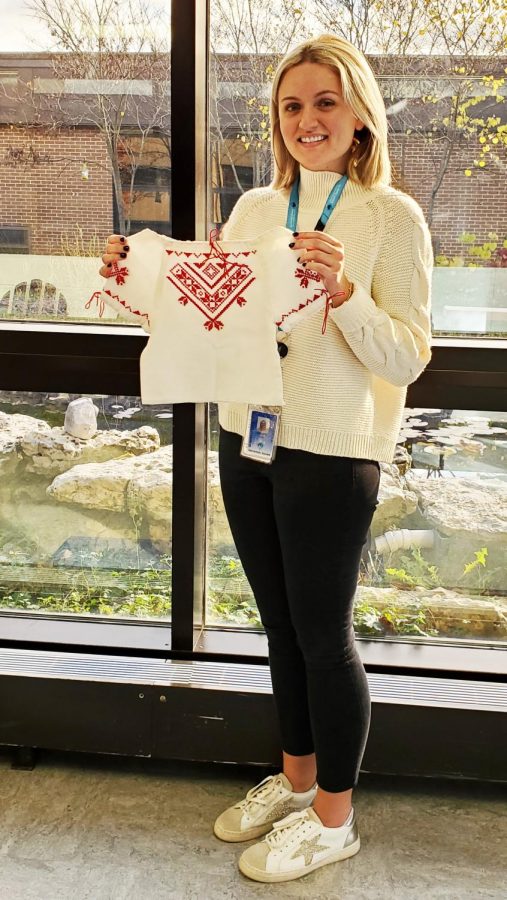Boundless achiever
Teacher’s ambition grounded in her heritage
Photo by Photo by Sasha Kek
Elizabeth Tise, English teacher, grew up in a Romanian household, and notices there is a difference between American and immigrant parents. “Because American society is so diverse and we are made up of a modge podge of different cultures, the lines get really blurry between what is politically correct and what is not politically correct,” Tise said. “Romania is a very small country, it’s a very particular culture and it’s a very, very old culture. We’ve been around since before the Roman Empire – before we were conquered by the Roman Empire, it was called Dachia; Romanian culture is older than Rome itself. It’s been around forever, so because that culture is very much established and very deeply rooted, and it’s had a much longer time to develop, I think that’s why it’s a little bit more stringent than American culture.”
First generation Americans walk the line between American and international culture. As a first generation Romanian-American, Elizabeth Tise, English teacher, says the trouble for children of immigrants is “constantly feeling like you don’t fully belong anywhere.”
“Whenever I visit Romania, I feel like I don’t really belong there because I wasn’t born there, and I am not 100% Romanian because I was raised in America and in an American society,” Tise said. “Even here, English is not my first language; I am constantly speaking a language that isn’t mine. I teach a language that isn’t really mine, so no matter where I am and no matter what situation I’m in, I feel like I don’t 100% belong because I’m not fully anything. I think that experience of being a child of immigrants is very unique because you’re not quite sure which box you fit in; I wouldn’t quite call myself an American, but I also wouldn’t quite call myself not American either.”
Tise says her parents held tightly onto their Romanian heritage and made the decision to homeschool her until she was 12 years old, so she grew up primarily speaking Romanian “because [my parents] wanted me to have very strong ties to my heritage, and to my language and culture,” Tise said.
“I did not speak English until I was in elementary school, so I was maybe eight years old when I really started to speak English,” Tise said. “[My parents] really instilled that idea of ‘you can be anything you want to be,’ so that was a really big reason why they chose to raise a family in this country; they told me that after they got married, they considered moving back to Europe, but they decided not to because they thought of this country as a land of opportunity. They would constantly remind me, ‘You live in a place where you can be anything that you want to be, and you are the only thing that’s going to get in your own way.’ That was something that was ingrained in me from the time that I was very, very young, that the only obstacle to me achieving my own dreams would be myself.”
Tise’s father immigrated to the United States after the Communist Revolution in 1990, and her mother came seven years later to marry Tise’s father.
“My parents are very hardworking and very principled people, who hold on very tightly to their principles; they stay very loyal to their culture and to their heritage. If you ask them, they still don’t consider themselves to be American, even though they are citizens,” Tise said. “Part of [Romanian] culture is a very strong work ethic, and in order to be considered a good person, you have to be a hard worker. People who are thought of as not hard working, it’s like a character flaw, so that’s very important to [my parents].”
True to their beliefs, Tise says her parents are hard working and “very educated” people.
“My parents are both professional musicians and both of them have bachelor’s degrees in performance. My dad is a classical guitarist and has a performance degree in classical guitar. My mom has a performance degree in classical voice,” Tise said. “My mom is a private vocal instructor and gives lessons to people wanting to learn to sing. My dad has a master’s degree in curriculum and instruction, so they’re both very educated and work in the field of education.”
Unlike Tise’s parents, her grandparents were often working under the communist government and were not around to raise her parents, according to Tise.
“I think my parents are successful in spite of their circumstances, and I think I’m successful because of my circumstances,” Tise said. “I think I’m very similar to my parents in the way that I am motivated to achieve my goals and set high expectations for myself, so I think that is something that I have in common with my parents. The difference is, I was given an environment that is conducive to that, whereas they did not have that set of circumstances that would be conducive to achieving things.”
And that environment, Tise says, was effective because it “pushed me to [a high] level of achievement.”
“I went to college on a full academic scholarship – I didn’t pay tuition for my bachelor’s degree,” Tise said. “I’m 23 years old and I’m almost done with my master’s degree, so I think that having that mindset of being able to do whatever I set my mind to has set me up for a lot of success. I graduated Summa Cum Laude and I have a 4.0 GPA in grad school.”
But it is not only immigrant parents that instill “that intrinsic motivation of wanting to be successful for yourself,” Tise said. Her best friend’s parents, who are “as American as they come,” also fostered the same idea, “however, there are still cultural differences,” Tise says.
“Her parents are a lot more informal than mine. Something culturally for me is that I would never call an adult by their first name ever; I don’t call my aunts and uncles by their first names, it’s not a thing,” Tise said. “When I met [my best friend’s] parents, her dad was like, ‘You can call me Steve,’ and I was like, ‘I absolutely will not do that. That is absolutely not happening.’ I still go to their house and call them Mr. and Mrs. Hintz, and they laugh at me every time. Romanian adults, if you were to call them by their first name, would have a heart attack.”
Another cultural aspect that “trips me up, even though I’ve been speaking English for the last 15 years,” Tise says, are idioms.
“Sometimes I’m not very familiar with idioms, so [my best friend] will say something that I don’t understand and I misunderstand her meaning. One example is when we were both student teachers at the same time, she texted me to say that her students were acting up that day. She said, ‘They must have put something in the water.’ I had never heard that idiom before and I thought her students were poisoning her. I was like, ‘Your students put something in your water?’ I was freaking out and I was trying to call her, like, ‘Did you call poison control? Are you okay?’ She said, ‘It’s just a saying that means the students are acting wild,’” Tise said. “I never heard that before, so every time I come across an idiom that I’m not familiar with, I always text her. ”
According to Tise, her parents passed down Romanian culture, superstitions, and idioms to her, which impact the way she lives her life in America.
“I think because I was raised speaking Romanian first and my parents made such a big deal out of our culture growing up, that definitely has impacted the way I experienced my life as a child of immigrants living in America,” Tise said. “They very well could have just abandoned their culture and had me raised to speak English and never teach me Romanian. They didn’t have to teach me those things, they didn’t have to pass down their superstitions to me, they didn’t have to teach me how to speak Romanian. I first learned to read and write in Romania, and I didn’t learn to read and write in English [right away]; they didn’t have to do those things, but they chose to. That’s now part of who I am because it was such an early formative experience.”

This is Sasha’s third and final year working with the Bear Facts staff as the LZ Life Editor. Aside from helping Bear Facts run smoothly, you can find...

